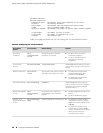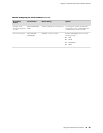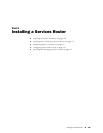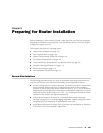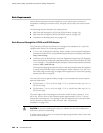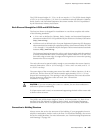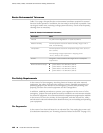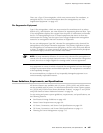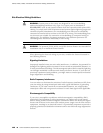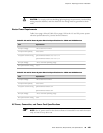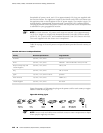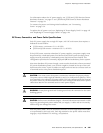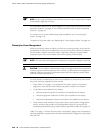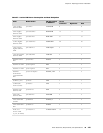
Router Environmental Tolerances
Table 53 on page 106 specifies the environmental conditions required for normal
Services Router operation. In addition, the site must be as dust-free as possible. Dust
can clog air intake vents, reducing cooling system efficiency. Check vents frequently,
cleaning them as necessary.
Table 53: Router Environmental Tolerances
ValueDescription
No performance degradation to 10,000 ft (3048 m)Altitude
Normal operation ensured in relative humidity range of 5% to
90%, noncondensing
Relative humidity
Normal operation ensured in temperature range of 0°C (32°F) to
40°C (104°F)
Non-operating storage temperature in shipping carton:
–40°C (–40°F) to 70°C (158°F)
Temperature
Designed to meet Telcordia Technologies Zone 4 earthquake
requirements
Seismic
■
J2320 chassis: 1091 BTU/hour (320 W)
■
J2350 chassis: 1195 BTU/hour (350 W)
■
J4350 chassis: 1092 BTU/hour (320 W)
■
J6350 chassis: 1126 BTU/hour (330 W)
Maximum thermal output
Fire Safety Requirements
In the event of a fire emergency involving Services Routers and other network
equipment, the safety of people is the primary concern. Establish procedures for
protecting people in the event of a fire emergency, provide safety training, and
properly provision fire-control equipment and fire extinguishers.
In addition, establish procedures to protect your equipment in the event of a fire
emergency. Juniper Networks products must be installed in an environment suitable
for electronic equipment. We recommend that fire suppression equipment be available
in the event of a fire in the vicinity of the equipment, and that all local fire, safety,
and electrical codes and ordinances be observed when you are installing and operating
your equipment.
Fire Suppression
In the event of an electrical hazard or an electrical fire, first unplug the power cord.
(For shutdown instructions, see “Powering a Services Router On and Off” on page 129.)
106 ■ Router Environmental Tolerances
J2320, J2350, J4350, and J6350 Services Router Getting Started Guide



